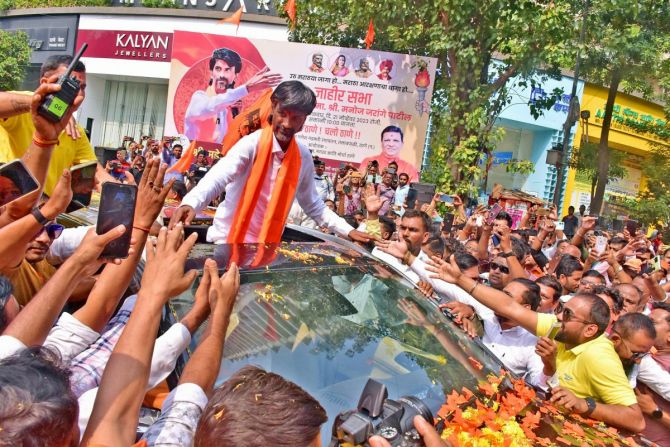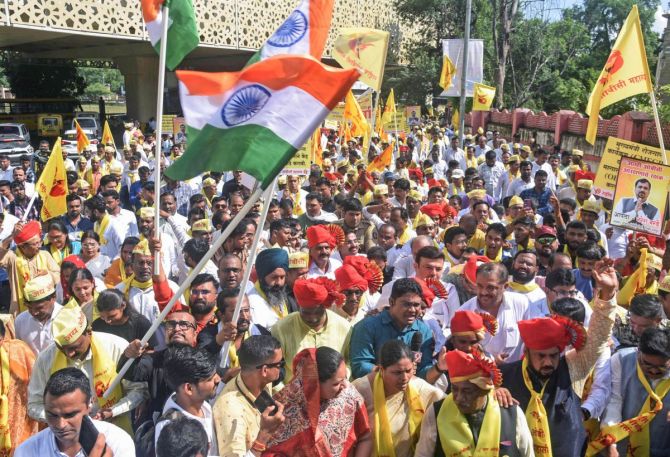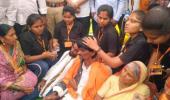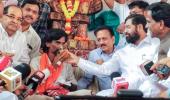Any move to appease the Marathas will boomerang.
Eknath Shinde is a worried man with the agitation not having an easy solution, notes Ramesh Menon.

India must be the only country in the world where people agitate to be seen as backward so that they benefit from reservations.
How logical is it for well-entrenched communities who dominate the political, financial and social spheres to demand reservations? Like the Patels in Gujarat, the Jats in Haryana and the Marathas in Maharashtra.
All three are landowning dominant castes. They are also politically powerful and are therefore able to force governments to bow down before them.
The Indian horizon is now rocked with the agitation by the Marathas in Maharashtra demanding reservation despite a Supreme Court ruling that said Maharashtra had reached its quota of 50 per cent reservations and there was no need to expand the list.
This was when a petition came up for hearing pleading that the Marathas also needed to be added to the reserved list to gain seats in educational institutions and government jobs.
Reservation has always been a contentious issue in India. It has led to numerous agitations, riots and violence in various states as communities demand inclusion in backward communities to benefit from reservations, mainly in jobs.
The demands have come from the Jats in Punjab, Haryana and Rajasthan, the Patels in Gujarat, the Gujjars in Rajasthan, the Sikhs in Punjab and now, we have the Marathas in Maharashtra.
The agitation is led by Mahesh Jarange-Patil, an unknown figure until he went on a fast. Even Maharashtra Chief Minister Eknath Shinde travelled to his Antarwali Sarati village in Jalna district to placate him.
It is an eloquent indicator of how politics shapes personalities and issues in a sociologically complex society.
Considering the sensitive issue, the Maharashtra government cannot afford to ignore the agitation. This time it took a violent turn with a lot of damage to public property.
The residences of NCP MLAs Prakash Solanke and Sandeep Kshirsagar were set on fire.
Some protesters attempted suicide and nearly a dozen have given their lives to the cause.
Posters of the chief minister and the two deputy chief ministers were set on fire and posters banning the entry of politicians were put up in over 400 Maratha dominated villages.
A few Maratha MPs and MLAs sensing the mood of the community, have sent in their resignation. More are expected to follow. It is not a pretty picture.
It is not easy for any government in Maharashtra to tackle the touchy issue. One way is for the central government to bring in a Constitutional amendment allowing more than 50 per cent reservation.
But that is hardly a solution as it will raise heckles all over India as there is an underlying feeling among the upper castes that they are being short-changed and denied a fair chance in educational seats and government jobs.
There is also a growing narrative that economic criteria should be the benchmark and not caste for reservations.
There is also a growing demand that the new emerging India must reward merit and not devalue it with more reservations.

Any move of the present government to appease the Marathas will boomerang. Leaders of other backward castes have threatened an agitation if the Marathas are added to the OBC list.
Maharashtra Chief Minister Eknath Shinde wants to pacify the agitating Marathas by granting them Other Backward Caste Certificates.
This is certainly not going to go well with other backward castes, as it would eat into their reservation pie.
They have threatened state-wide agitations and will also possibly challenge it in court.
As it is, Shinde is treading on eggshells as his political future hangs in balance with Devendra Fadnavis, the former chief minister and one of the state's two deputy chief ministers, waiting in the wings.
Shinde is a worried man with the agitation not having an easy solution.
Banning the entry of elected representatives from various political parties in various villages by the agitators is clearly a tactic to send ripples of worry to them as Lok Sabha elections are just months away.
In fact, Manoj Jarange-Patil has said that this is the best time to agitate.
No political party knows how to handle the situation and are offering lip sympathy to the cause.
It is going to be a long haul for the Shinde-led government.
Traditionally, the Marathas are an agricultural community, But over the years, they played a significant political role in Maharashtra.
They emerged as a political and socially relevant group as able warriors and administrators under Chhatrapati Shivaji Maharaj.
After the formation of Maharashtra and a new surge for identity, there were challenges like changes in agricultural realities and the need to be educated to clinch jobs and emerge as a prominent force.
As competition hotted up, the Maratha youth started feeling left out in the race to the top of the social and economic ladder.

The first demand for reservation arose in 1982 when a labour leader, Annasaheb Patil, demanded that it be based on economic criteria.
Then, it surfaced again after the Mandal Commission Report in 1990, demanding that it be based on a quota for the community.
In 2016, the demand was raised again, saying the community should be clubbed among the other backward castes.
It was in early 2000 that demands for reservation started to surface as the Maharashtra State Backward ClassCommission labelled the Marathas as a socially and educationally backward class.
Predictably, all political parties supported the demand as they did not want to lose the Maratha vote as they constituted over 31 per cent of the population.
The 2018 Maharashtra State Reservation for Socially and Educationally Backward Classes Act provided the Maratha community reservation in public education and employment was brought in by the then Devendra Fadnavis-led government to quell the Maratha agitation.
However, it was struck down by a five-judge Constitutional bench of the Supreme Court in 2021 saying that the 50 per cent ceiling for reservation cannot be breached.

One argument justifying reservation was that most Marathas are involved in agriculture, which faces many financial challenges today, and many of them are small landholders and not big wealthy farmers.
The Marathwada region often witnesses droughts affecting farmers, which is why it has emerged as the Maratha agitation's epicentre.
As Marathas form nearly 31 per cent of the population, no political party can afford to ignore them.
The Marathas have had a say in the state's politics since Maharashtra became a separate state on May 1, 1960.
Yeshwantrao Chavan, Sharad Pawar, Vasantdada Patil, Vilasrao Deshmukh and Prithviraj Chauhan were some prominent chief ministers who were Marathas.
In 2014, the then Prithviraj Chavan led Congress-Nationalist Congress Party government attempted to provide 16 per cent reservation for Marathas through an ordinance just before the assembly elections obviously eyeing votes.
But the Congress-NCP alliance lost the 2014 election to the Bharatiya Janata Party-Shiv Sena coalition as the ordinance lapsed.
In 2018, then chief minister Fadnavis, heading a BJP-Shiv Sena coalition government, granted 16 per cent reservation to Marathas in education and jobs.
But it was struck down by the Supreme Court, which noted it violated the 50 per cent reservation ceiling.
A study by Ashwani Deshpande of the Ashoka University and Rajesh Ramachandran of the University of Heidelberg on the demand for reservations by dominant communities, said that 49 per cent Marathas cultivated land compared to 43 per cent Brahmins, 36 percent forward castes and 26 per cent scheduled castes and tribes.
The study pointed out that other backward castes and scheduled castes and scheduled tribes lagged behind upper castes on a range of material indicators and so extending quotas to relatively richer and powerful groups would amount to diluting the already small and shrinking entitlement for communities that are truly disadvantaged and discriminated against.
If politicians are worried about the call for more and more reservations from powerful caste groups, it is with good reason.
They do not know how to deal with it especially with elections round the corner.
Ramesh Menon, award-winning journalist, educator, documentary film-maker and corporate trainer, is the author of Modi Demystified: The Making Of A Prime Minister.
Feature Presentation: Aslam Hunani/Rediff.com











 © 2025
© 2025